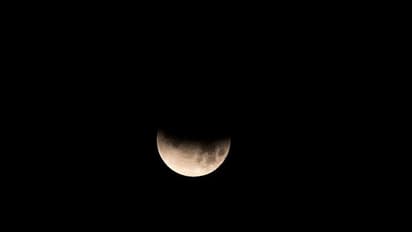Lunar Eclipse 2021: Date, time, where and when to watch; details inside

Synopsis
On November 19, a tiny portion of the partial phase of the moon eclipse will be visible from regions of Andhra Pradesh and Assam.
The second and last lunar eclipse of the year will occur on November 19. It will be a partial lunar eclipse that lasts around six hours. This will be the century's longest partial lunar eclipse. Some regions of northeastern India will be able to see the eclipse. It will also be visible from Western Africa, Western Europe, North America, South America, Asia, Australia, the Atlantic and Pacific Oceans, and the Indian Ocean. On November 19, a tiny portion of the partial phase of the moon eclipse will be visible from regions of Andhra Pradesh and Assam.
The partial phase of the lunar eclipse will last 6 hours and 1 minute in total. It will begin at about 11.30 a.m. IST and terminate at approximately 5.33 p.m. IST. According to the Hindu calendar, November 19 is also Kartik Purnima. Those who cannot view the celestial spectacle from their homes can watch it live on NASA's website.
"
In the twenty-first century, the Earth will witness a total of 228 lunar eclipses. According to NASA, a lunar eclipse may occur no more than three times every year.
Also Read | Here are some 'Solar Eclipse' weird myths in India that will make you laugh
A lunar eclipse happens on a full moon day when the Earth passes between the Sun and the Moon, and all three objects are aligned. When the entire Moon passes through Earth's umbral shadow, this is referred to as a total lunar eclipse. In contrast, a partial lunar eclipse occurs when only a portion of the Moon passes through Earth's umbral shadow. A lunar eclipse can occur no more than three times each year.
The next moon eclipse will occur in India on November 8, 2022.
Also Read | Want to witness the Blood Moon? Here's where you can watch it online